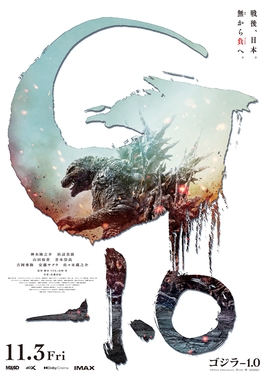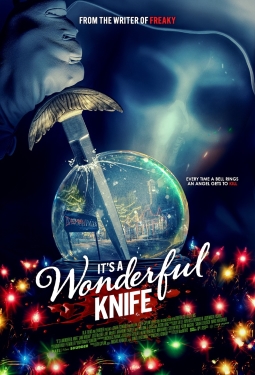After 2016’s amazing Shin Godzilla, it took a while for Toho Studio to give us a follow up. Another stand alone film, Godzilla Minus One gives us Godzilla as a metaphor for war, and how humans deal with the crushing effects imposed by mass destruction. And, damn, it's a great film.
The film opens on a small airfield on an island in Japan, as kamekazi pilot Koichi Shikishima (Ryunosuke Kamiki) feigns mechanical issues to avoid his mission. After mechanic Sosaku Tachibana (Munetaka Aoki) tactfully calls him out, the island is attacked by a twenty to thirty foot Godzilla.
Koichi goes to his plane, with the intent of shooting the giant monster with the plane’s guns, but freezes, allowing the creature to kill everyone on the base but Koichi and Tachibana, who blames the pilot for the deaths of the others on the island.
Things don’t get much better for Koichi when he returns home to find his family died during the bombing and his neighbor, Sumiko Ota (Sakura Ando), blames him for not following his mission and causing the death of her family.
Koichi gets involved with Noriko Oishi (Manami Hamabe), a woman trying to survive in the ruins of Tokyo with Akiko, a child she “adopted” after her parents died. Dealing with this new family, Koichi gets a job clearing the mines left in the waters surrounding Japan after the war. But Godzilla comes back, juiced up by the Bikini Atoll test, and unleashes hell on post-war Japan. While America is unwilling to bring its military might to confront the threat, fearing such actions might provoke the Soviet Union, it falls upon a group of Japanese civilians to take Godzilla down
And, of course, kiaju mayhem ensues.
But mayhem is not what this film is about. It’s about people dealing with the destructive consequences of war, expected to fight a devastating power that dwarfs their capabilities, and how it affects them should they survive. Whether or not you condone how the characters react in the film, it all feels very real.
Unlike Shin Godzilla, which highlights a government's inability to react to a massive threat (I'm not going to say the Japanese government, as that film could apply to any world power), writer/director (and VFX director) Takashi Yamazaki harkens back to Godzilla as a metaphor for nuclear war (his heat breath unleashes a mushroom cloud), while dealing the struggles of those caught in the middle. And the guilt Koichi feels for his inaction during the war delivers an emotional impact that I didn’t expect from a kaiju film. You'll probably find some tears in your eyes during the final act, as I did, but the script earns it. Even if the last scene feels improbable, I was happy to cry during it. It showed that, no matter the horrors we face from government dictates, and events beyond our control, we can always find a space for forgiveness and peace. It's a powerful message, as characters put their animosities aside and forgive those they feel failed them. I must admit, I really felt hope for humanity watching this film.
Takashi does include several scenes that harken back to the 1954 classic, which is fun for fans. But it also cements the fact that he's using the monster as a metaphor for something bigger than simple kiaju thrills. Not that it doesn't deliver on that aspect. The sequences when Godzilla appears are as exhilarating as any recent giant monster movie, despite the low budget. Seriously, given the reported budget, the VFXs are amazing.
But such thrills aren't due to the effects, as good as they are. As most of the movie is spent with the human characters, it's their reaction to the threat that makes the action sequences so engaging. I wouldn't have been so engaged during the boat chase had Takashi not spent time with the crew of the mine-sweeping boat that Koichi is on. The three other crew members are so well written, and the actors are so good, that, while I expected they'd survive (as the main protagonist is aboard), I was still concerned for their safety. I wanted them all to live, and worried somehow they'd die and Koichi would be the sole survivor. That's great filmmaking.
Sure, this scene is cool. But if you care about the people on the boat, it's more terrifying. Just like Jaws.
I don't want to say much more about this film, and risk spoilers, other than you must see it on the big screen if you can. If you don't like giant monster movies, well, you're probably not reading this review. But, again, this isn't about Godzilla, the film is about the people that have to react against the overwhelming force facing them, after dealing with the horrors of a war that caused as much devastation as the giant lizard stomping across Japan.
The emotional impact delivered by Godzilla Minus One makes it a strong candidate for the best film I've seen this year, which includes my previous number one, Oppenheimer. Yeah, it's that good, and it deserves the box office attention it's receiving.
I get every studio is trying to create a money making cinematic universe, but I really hope Toho keeps giving us one offs like Godzilla Minus One. Let Legendary Pictures continue the Monsterverse. I'll go see them for the thrills, but I’d like Toho to continue to deliver Kiaju movies with a message and an emotional impact. As this film proves, there’s room for both.
Metaphor or not, this Godzilla is terrifying in this film.










